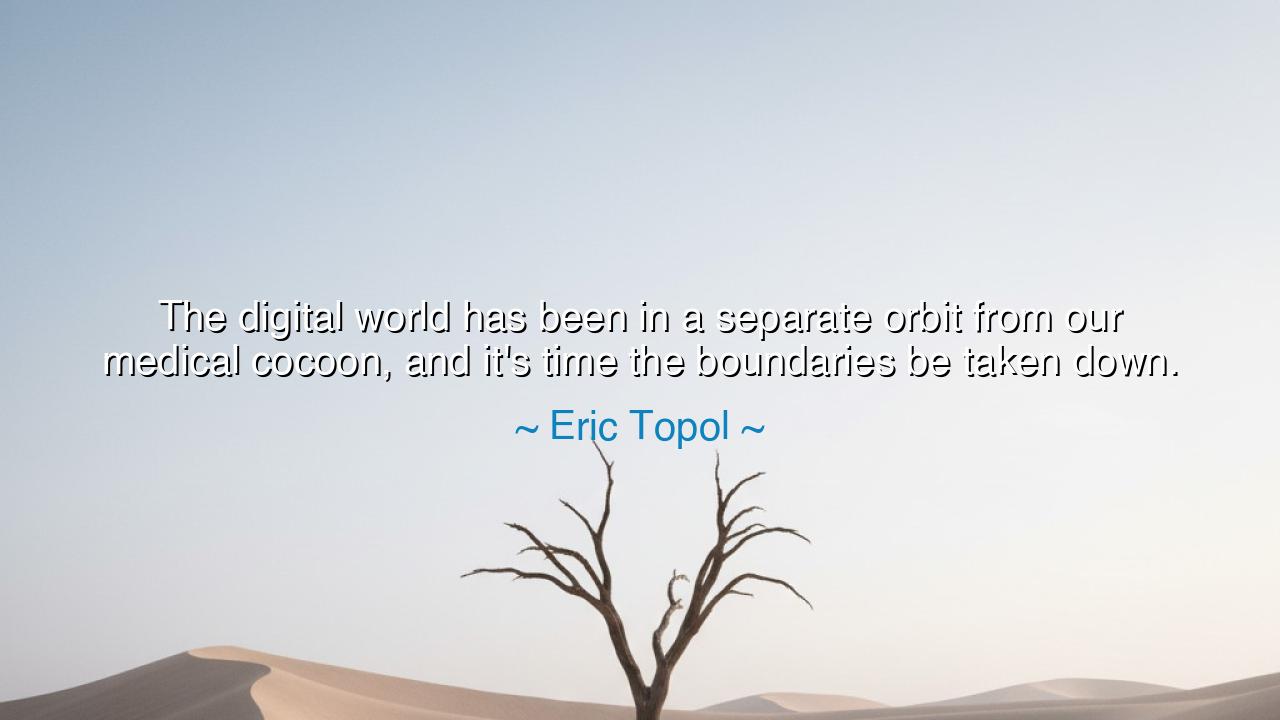
The digital world has been in a separate orbit from our medical
The digital world has been in a separate orbit from our medical cocoon, and it's time the boundaries be taken down.






In the words of Eric Topol, physician, visionary, and prophet of modern medicine, there is both a challenge and a call to awakening: “The digital world has been in a separate orbit from our medical cocoon, and it’s time the boundaries be taken down.” These words, though spoken in the language of our age, echo with the timeless tone of revolution. They are not merely about machines or screens, but about the meeting of two worlds — the world of technology, swift and boundless, and the world of medicine, cautious and enclosed. Between them lies a vast space that must be bridged if humanity is to heal not only the body, but the systems that have long governed it.
Topol, born in the era of stethoscopes and paper charts, has lived to see the rise of a new age — an age where the digital world holds the power to transform how we live, learn, and care for one another. Yet medicine, he observes, has remained sheltered within its cocoon, bound by tradition, regulation, and the weight of its own history. The physician’s world, once the center of all knowledge about the human body, now finds itself orbiting apart from the dynamic energy of the digital age. And so Topol speaks as one calling for convergence — for the walls to fall, for the tools of data, artificial intelligence, and connectivity to join hands with the healer’s art.
The medical cocoon he describes is not a prison born of malice, but of habit. For centuries, medicine guarded its wisdom in books, its methods in secrecy, its authority in hierarchy. The doctor’s word was sacred, the patient’s role submissive. But the digital world, with its flood of open information and shared power, challenges this old order. Now, patients can read their own lab results, monitor their own hearts, and search the world’s knowledge in a single moment. What was once hidden behind walls of jargon is now accessible to anyone with a device and curiosity. This democratization of knowledge, though feared by some, is the very dawn that Topol celebrates. For in his vision, the boundaries between doctor and patient, machine and man, data and compassion must dissolve — not to destroy medicine, but to renew it.
There is a parable in history that mirrors this transformation. In the fifteenth century, when Gutenberg unveiled the printing press, the written word — once controlled by monasteries and scholars — burst forth into the hands of the common people. Many in the learned class feared chaos: they said that if knowledge were freed, the untrained would misinterpret it, and truth itself would be endangered. Yet the opposite came to pass. The explosion of shared knowledge gave rise to science, art, and enlightenment. So too, says Topol, must medicine embrace its own digital renaissance. For just as the printing press broke the monopoly of words, so will digital technology break the monopoly of medical knowledge, freeing humanity to take charge of its own well-being.
But let us not mistake his call as blind worship of technology. Topol’s wisdom is tempered with humanity. He knows that data without empathy is sterile, that algorithms cannot feel a patient’s fear or soothe a dying soul. His dream is not to replace the physician, but to liberate them — to free them from paperwork, from inefficiency, from systems that bury compassion beneath bureaucracy. He envisions a medicine where the digital world does not orbit apart, but intertwines with care — where every doctor has the world’s knowledge at their fingertips, and every patient holds power over their own health.
This transformation demands courage, for to take down boundaries is to risk the unknown. It calls upon the healers of our time to look beyond their training, to learn the language of data and design, and to welcome innovation without fear. It calls upon patients to take responsibility, to become active participants in their own healing. And above all, it calls upon society to see technology not as a cold intruder, but as a tool of connection — a bridge between mind and machine, between wisdom and wonder.
So, my children, let this truth be etched in your hearts: medicine must evolve, but it must not forget its soul. The physician must wield technology as a sword of knowledge, not a shield of distance. The patient must learn to walk beside the doctor, not behind him. The digital world and the medical world, once separate, must become one — partners in the ancient art of preserving life.
For the time has come, as Eric Topol declares, to open the cocoon. The old wings of medicine must unfold anew, shimmering with data, yet beating with compassion. And when the boundaries fall, when science and technology join hands with empathy and wisdom, humanity will soar higher than ever before — not as machines, nor as patients, but as creators and caretakers of our own healing destiny.






AAdministratorAdministrator
Welcome, honored guests. Please leave a comment, we will respond soon